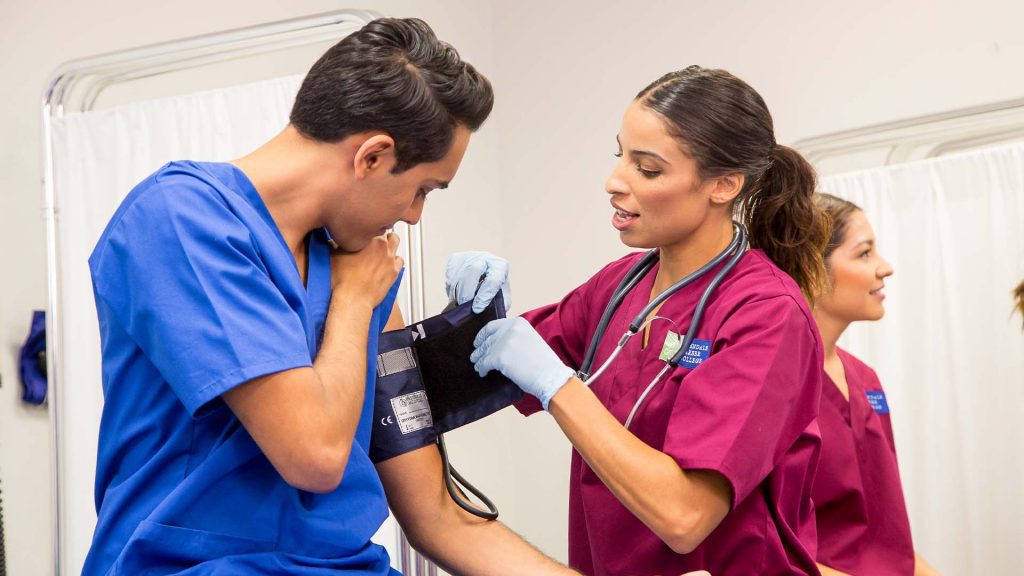Important information about the Distribution of Emergency Financial Aid Grants to Students under the Higher Education Emergency Relief Fund (HEERF)
The Coronavirus Aid, Relief, and Economic Security Act (“CARES Act”) Higher Education Emergency Relief Fund (HEERF) provides funding to students whose lives have been disrupted as a result of the coronavirus global pandemic.
The U.S. Department of Education has made available emergency financial aid grants to students of institutions who need financial support for expenses related to the disruption of campus operations due to the COVID-19 outbreak, including things like course materials and technology, as well as food, housing, health care, and childcare. The institutions will then determine which students will receive the cash grants.
Higher Education Emergency Relief Fund Report
Emergency Financial Aid Grants to Students 30 Day Funding Report
Glendale Career College – Glendale Campus and San Diego Campus
- HEERF 30 Day Funding Report – Distribution as of 6/14/20
- HEERF 30 Day Funding Report – Distribution as of 9/30/20
- HEERF 30 Day Funding Report – Distribution as of 12/31/20
- HEERF 30 Day Funding Report – Distribution as of 3/31/21
- HEERF 30 Day Funding Report – Distribution as of 6/30/21
- HEERF II 30 Day Funding Report – Distribution as of 9/30/21
- HEERF II 30 Day Funding Report – Distribution as of 12/31/21
- HEERF II 30 Day Funding Report – Distribution as of 3/31/22
- HEERF II 30 Day Funding Report – Distribution as of 6/30/22
- HEERF II 30 Day Funding Report – Distribution as of 9/30/22
- HEERF II 30 Day Funding Report – Distribution as of 12/31/22
Quarterly Budget and Expenditure Reporting under CARES Act Sections 18004(a)(1) Institutional Portion, 18004(a)(2), and 18004(a)(3), if applicable
Glendale Career College – Glendale Campus and San Diego Campus
- Quarterly Budget and Expenditure Report – Quarter ending 9/30/20
- Quarterly Budget and Expenditure Report – Quarter ending 12/31/20
- Quarterly Budget and Expenditure Report – Quarter ending 3/31/21
- Quarterly Budget and Expenditure Report – Quarter ending 6/30/21
- Quarterly Budget and Expenditure Report – Quarter ending 9/30/21 – Final Report
Overview
The Coronavirus Aid, Relief, and Economic Security (CARES) Act includes the Higher Education Emergency Relief Fund (HEERF I), which provides more than $14 billion in emergency funding to higher education institutions across the country. Of those funds, more than $6 billion must go directly to students in the form of emergency financial aid grants (HEERF I -student emergency grant funds) for expenses related to the disruption of campus operations due to the COVID-19 global pandemic. The College has received an allotment of these funds for eligible students, which will be distributed by the College in three phases.
The Coronavirus Response and Relief Supplemental Appropriations Act (“CRRSAA”) was signed into law on December 27, 2020, and established the Higher Education Emergency Relief Fund (“HEERF II”) to provide emergency financial aid grants to exceptionally needy students. The CRRSAA or HEERF II grants can be used for expenses relating to the student’s standard cost of attendance or additional expenses resulting from the Covid-19 pandemic.
These FAQ’s are published to address some of the questions students may have.
Frequently Asked Questions and Answers (HEERF I)
Q: Which students are eligible to receive HEERF I-student emergency grant funds?
A: Based on guidance from the U.S. Department of Education issued on April 21, 2020, to receive HEERF I -student emergency grant funds, students must be eligible to receive Title IV federal financial aid (e.g., Pell Grant, Direct Loans, etc.) and have incurred additional expenses due to campus disruptions due to the COVID-19 global pandemic, such as food, housing, technology, course materials, health care, and childcare. After confirming a student meets these requirements, the institution retains discretion over which students will receive HEERF I – student emergency grant funds and the amount of the award.
UPDATED 6/14/2021 – Students included in Phase Three and Phase Four of the distribution plan are not required to have incurred expenses due to the disruption of campus operations due to the COVID-19 pandemic. Rather, students in these groups are required to have an exceptional need and be actively enrolled on March 1, 2021.
Q: Are students required to have a Free Application for Federal Student Aid (FAFSA) on file in order to be eligible for the HEERF I -student emergency grant funds?
A: In order to establish a student’s eligibility for HEERF funding, students must be able to demonstrate their eligibility for Title IV federal student aid. To do so, the College requires the student to complete a FAFSA application and meet the other related student eligibility requirements. In addition, the student must have qualifying expenses and be an active student in good standing.
UPDATED 6/14/2021 – Students in Phase Three and Phase Four will be identified by the outcome of the FAFSA application called the Expected Family Contribution (EFC). Students with a Pell Grant eligible EFC are considered to be exceptionally needy.
Q: What criteria were used to determine who receives the HEERF I-student emergency grant funds?
A: The College is distributing the HEERF I funds in four phases.
Phase One: The College used the following criteria to identify the cohort of eligible students: 1) an active student who was attending courses on campus as of 03/13/2020, the date the COVID-19 national emergency was declared, and are active or on an approved leave of absence as of 05/18/2020, 2) a student with established eligibility for Title IV funds who has a valid ISIR with an official EFC on file with the College, and 3) a student who has returned a complete Student Attestation Form.
Phase Two: The College will make subsequent equal disbursements to all students who received a Phase One disbursement who were active on March 13, 2020, and are still active on June 15, 2020. This phase will not require an additional attestation from the student.
UPDATED 4/5/2021 – Phase Three: The remaining HEERF I funds will be distributed to Pell Grant eligible students who are actively enrolled on March 1, 2021. The funds will be awarded based on the funds remaining and the number of eligible recipients.
UPDATED 6/14/2021 – Phase Four: All outstanding uncashed HEERF I student checks from all prior phases will be canceled around June 10, 2021, to be redistributed to exceptionally needy students. Students who received a Phase Three disbursement who received an automatic zero EFC on their FAFSA used to determine eligibility for the HEERF I funds will receive an additional disbursement of HEERF I funds from this final distribution phase.
Q: How much will I receive in the HEERF I -student emergency grant assistance and when will it be disbursed?
A: There will be three disbursements of the HEERF-student emergency grant assistance. The Phase One disbursement will occur on or about May 27, 2020, and the Phase Two disbursement will occur on or about June 15, 2020. Each disbursement will be $700 per recipient. Each recipient must meet the criteria discussed above to receive each disbursement.
UPDATED 4/5/2021 – Phase Three funds award amounts will be distributed to students on or about April 15, 2021, with award amounts varying based on the remaining fund amount and number of eligible recipients.
UPDATED 6/14/2021 – Phase Four award amounts will be disbursed to students on or about June 15, 2021, with award amounts varying based on the remaining fund amount and number of eligible recipients.
Q: How will the students receive the funds?
A: Once the College determines eligibility, a check will be mailed to the student’s address. The check must be endorsed by the student and cashed within 90 days of the date of the check. If a check is not cashed in 90 days, the check will be canceled, and the student will need to request a re-issuance of the check.
UPDATED 6/14/2021 – All outstanding uncashed HEERF I checks from Phases One, Two, and Three will be canceled on or about June 10, 2021, and reissued to other eligible students in Phase Four.
Q: What does the phrase “disruption of campus operations” mean?
A: This refers to any change in the way the College operates that resulted from its response to the COVID-19 global pandemic. This includes, but is not limited to, the closure of the campus and the move to online instruction. It also includes the resulting lack of services available to students due to the campus closure.
Q: Which students are not eligible to receive HEERF I-student emergency grant funds?
A: Based on guidance from the U.S. Department of Education, issued on April 21, 2020, the following students are not eligible to receive HEERF I funds:
International and Undocumented Students: In order to receive the HEERF-student emergency grant funds, the Department of Education states students must meet Title IV federal student aid eligibility requirements. Therefore, international and undocumented students are not eligible to receive HEERF I -student emergency grant funds.
Distance Education/Online Students: Students who were enrolled exclusively in online programs on March 13 (the date the COVID-19 national emergency was declared) are not eligible for HEERF I -student emergency grant funds, according to the Department of Education’s guidance.
UPDATED 6/14/2021 – Online students are included in the Phase Three and Phase Four award distribution.
Q: Which expenses are the HEERF I-student emergency grant funds for? And what can students use these funds for?
A: HEERF I-student emergency grant funds provide monetary assistance to students whose education has been disrupted due to the COVID-19 global pandemic. The U.S. Department of Education has made the emergency grant aid available to students of institutions who need financial support for additional expenses related to the disruption of campus operations due to the COVID-19 global pandemic, including course materials and technology as well as food, housing, health care, and childcare. For example, because the College changed to online courses, a student may have incurred expenses to purchase a web camera, printer, computer software, or faster internet service.
UPDATED 6/14/2021 – HEERF I funds issued in Phases Three and Four may be used for any expense included in the student’s standard cost of attendance, including the payment of an outstanding tuition balance as long as it occurred after March 13, 2020. Students must provide written authorization for the HEERF I funds to be used to pay an outstanding tuition balance.
Q: What do students need to do, or what type of application does the student need to complete to participate in the HEERF I-student emergency funds?
A: If a student meets the eligibility requirements, the College will email the student the required Student Attestation Form (Phases One and Two), which the student must complete and return. The completed form confirms the College’s assumption that the student had the qualifying additional expenses due to the campus disruptions caused by the COVID-19 global pandemic.
UPDATED 6/14/2021 – There is no application or attestation form for Phases Three and Four. The College will determine the students who are eligible to receive funds in these Phases.
Q: What do you need to do if you have not received the Student Attestation Form?
A: If a student meets the eligibility requirements, but has not received the Student Attestation Form, he or she should contact Sandy Cheung (SandyC@Success.edu) and request a Student Attestation Form.
UPDATED 6/14/2021 – There is no Student Attestation Form for Phases Three and Four.
Q: Are there additional HEERF I emergency grant funds available to students with higher expenses and special needs?
A: Yes. Students with additional expenses (above and beyond the funds already disbursed) and special needs, may complete an application for additional funds when the applications become available.
UPDATED 04/05/2021 – The remaining available portion of the emergency grants will be used for Phase Three for students with exceptional need. Students with exceptional need are those students who are eligible to receive Federal Pell Grant funds, and are active students who were in attendance as of 03/01/2021.
There will not be an application process for Phase Three, and the College is using Federal Pell Grant eligibility data and the students’ status as of 03/01/2021 to determine the eligible cohort of students. The award amount is based upon the availability of funds.
UPDATED 6/14/2021 – The Phase Four distribution will be made to students with exceptional financial need as identified using FAFSA data on file at the College. There is no additional application needed unless the student had a change in financial circumstances since the FAFSA was filed.
Q: Is a student who is on an approved leave of absence eligible to receive the funds?
A: It depends. For Phase One and Two, the student would be eligible if the student was an active student on March 13, 2020, and otherwise eligible, and went on an approved leave of absence because of the COVID-19 global pandemic. If a student started a leave of absence before March 13, 2020, the student would not be eligible for the emergency grant.
UPDATED 4/5/2021 – For Phase Three, the student must be active as of March 1, 2021, to be eligible.
Q: I am not financially responsible for the expenses because I am unemployed and my significant other is responsible for the expenses. Will I be able to receive the grant?
A: If you have incurred additional expenses due to the disruption of campus operations and someone in your household (spouse or parents) pays those expenses, you can consider yourself to be financially responsible for those expenses. You may not consider yourself to be financially responsible for the expenses if they are paid by someone outside of your household or another entity.
Q: Does the HEERF I emergency grant have to be repaid?
A: No, this is grant assistance and does not need to be repaid.
Frequently Asked Questions and Answers (HEERF II)
Q: Which students are eligible to receive HEERF II – student emergency grant funds?
A: HEERF II funds will be prioritized to provide relief for students with exceptional financial need. The College will assess an individual student’s eligibility based on information provided on the Free Application for Federal Student Aid (FAFSA) to identify students with exceptional need. If a student has not filed a FAFSA and is interested in receiving the grant, we encourage the student to file a FAFSA as soon as possible. If a student is unable to complete the FAFSA for eligibility reasons, the College has established an alternative process to evaluate students outside of submitting the FAFSA application.
Q: Are students required to have a Free Application for Federal Student Aid (FAFSA) on file to be eligible for the HEERF II – student emergency grant funds?
A: No. Filing a FAFSA is not required to receive a HEERF II grant. However, the Colleges uses the outcome of the FAFSA process to identify students with exceptional need. To be considered for the HEERF II grant, a student must either complete a FAFSA or provide financial and household information to the College for review.
Q: What criteria were used to determine who receives the HEERF II – student emergency grant funds?
A: The College is distributing the HEERF II funds in phases and the determination of eligibility is made as follows:
Phase One: The College used the following criteria to identify the Phase One cohort of eligible students: 1) All active students who were attending courses as of 04/30/2021, and 2) who are eligible to receive Federal Pell Grant Funds with a valid Student Aid Report. Each eligible student was provided a $500 grant in Phase One.
Phase Two: The College used the following criteria to identify the Phase Two cohort of eligible students: 1) All active students who were attending courses as of 08/31/2021, and 2) with an zero EFC in the Student Aid Report. Each eligible student was provided a $700 grant in Phase Two.
Phase Three: The College used the following criteria to identify the Phase Three cohort of eligible students: 1) All active students who were attending courses as of 11/30/2021, and 2) with an zero EFC in the Student Aid Report. Each eligible student was provided a $700 grant in Phase Three.
Phase Four: The College used the following criteria to identify the Phase Four cohort of eligible students: 1) All active students who were attending courses as of 03/30/2022, and 2) with an zero EFC in the Student Aid Report. Each eligible student was provided a $700 grant in Phase Four.
Phase Five: The College used the following criteria to identify the Phase Five cohort of eligible students: 1) All active students who were attending courses as of 05/31/2022, and 2) with an zero EFC in the Student Aid Report. Each eligible student was provided a $700 grant in Phase Five.
Phase Six: The College used the following criteria to identify the Phase Six cohort of eligible students: 1) All active students who were attending courses as of 09/30/2022, and 2) with an zero EFC in the Student Aid Report. Each eligible student was provided a $700 grant in Phase Six.
Phase Seven (Final): The College used the following criteria to identify the Phase Seven cohort of eligible students: 1) All active students who were attending courses as of 11/30/2022, and 2) with a valid EFC in the Student Aid Report. Each eligible student was provided a $725 grant in Phase Seven.
Q: How are HEERF II funds to be used?
A: A HEERF II recipient can use the grant funds to pay any portion of the standard cost of attendance, such as expenses for tuition, housing, food, and transportation, or for expenses due to the pandemic, such as expenses for technology, healthcare, or childcare.
Q: Can I use my HEERF II funds to pay my outstanding tuition balance?
A: Yes, a student may provide written authorization for the College to apply his/her HEERF II grant to an outstanding balance as long as the balance was created after March 13, 2020.
Q: What do students need to do, or what type of application does the student need to complete to participate in the HEERF II-student emergency funds?
A: If a student has completed the FAFSA and has not had a change in his/her financial situation, no application or separate attestation is required. If the student has not filed a FAFSA, the student must either do so or contact the College for further instructions if he/she is unable to complete the FAFSA. If a student has had a change in his/her financial situation since the FAFSA was filed, the student should contact the College’s financial aid office for a reevaluation of aid eligibility based upon the current financial situation.
Q: How will the students receive the funds?
A: Once the College determines eligibility, a check will be mailed to the student’s address. The check must be endorsed by the student and cashed within 90 days of the date of the check. If a check is not cashed in 90 days, the check will be canceled, and the student will need to request a re-issuance of the check.
Q: How do I request that the College apply my HEERF II grant to my unpaid balance?
A: All HEERF II grant recipients with an outstanding unpaid balance will receive an email with information and instructions on how to provide written authorization to apply the grant to an outstanding balance. This is optional and not a requirement to receive the HEERF II grant.
Q: Does the HEERF II emergency grant have to be repaid?
A: No, this is grant assistance and does not need to be repaid.











